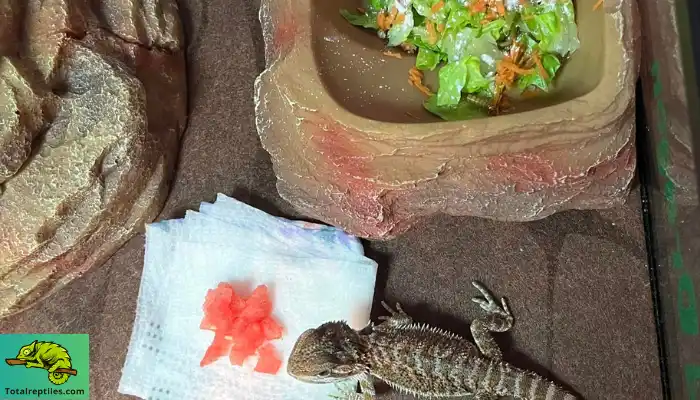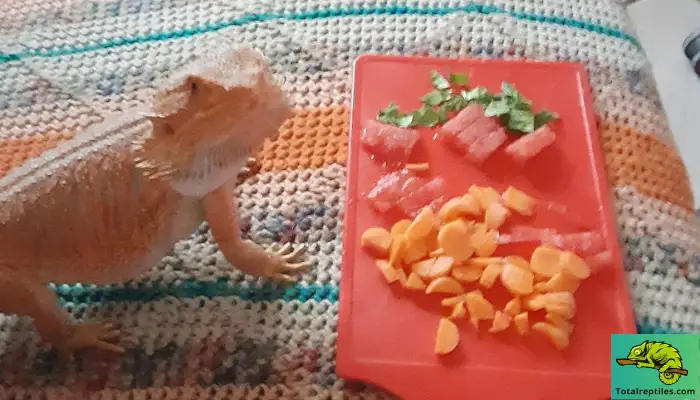Yes, bearded dragons can eat guava! This sweet, tropical fruit contains beneficial nutrients that can supplement a balanced bearded dragon diet. Guava is packed with vitamin C, antioxidants, and fiber. It provides a tasty way to boost nutrition.
There are also hazards. The natural sugars should only be an occasional treat, not a staple. And the small seeds could pose a choking hazard. Guava can be a safe, healthy addition to your bearded dragon’s menu with proper preparation and portion sizes.
In this article, we’ll explore the benefits of guava for bearded dragons and how to feed it safely.

Is Guava Safe for Bearded Dragons?
Safety should always come first when researching new foods for bearded dragons. Look at some potential perks and risks of adding this fruit to their menu.
The Nutritional Benefits
The great news is that this fruit packs some stellar nutrition for our reptilian diet. Here are some of the top nutrients and benefits:
- Vitamin C – Guavas contain way more of this immune-booster than oranges! Supporting healthy scales and bones.
- Fiber – The seeds and skin provide roughage to aid digestion. Preventing weird poops is a win in my book.
- Antioxidants – With carotenoids like lycopene, this fruit can help reduce oxidative stress and inflammation.
Other beneficial components include potassium, magnesium, and beneficial sugars for energy. So guava seems like a fruit loaded with good stuff for bearded dragons.
But we must look at potential risks and considerations before jumping on the guava train.
What About the Risks?
We should examine the pros and downsides before feeding our pets new meals. Keep these in mind:
- Natural sugar – Guavas contain fructose and glucose, which can lead to obesity if overfed.
- Oxalates – These compounds bind to calcium, potentially causing deficiencies with excess intake.
- Seeds – The hard, indigestible seeds could pose a choking hazard for bearded dragons.
Not risk-free. There are strategies to reduce these risks:
- Feed in moderation, only as an occasional treat.
- Monitor your dragon’s health and stool.
- Always remove the seeds before serving!
Guava can be part of a nutritious diet if you take precautions. For a balanced perspective, let’s look at some other fruits and veggies that are vet-approved for bearded dragons:

- Fig
- Mango
- Melon
- Blueberries
- Bell peppers
- Carrots
- Sweet potato
Talk to an exotic vet about the best produce picks for your pet’s needs.
Benefits of Guava for Bearded Dragon Health
So, we’ve established that bearded dragons can safely enjoy guava in moderation. But what are some specific ways this tropical fruit can boost their health?
Vitamin C – Guavas’ high vitamin C content can work wonders for your bearded dragon’s scales and bones. This nutrient aids collagen production and calcium absorption – great news for growth and shedding!
Digestion promotes good gut health and regularity to keep things moving smoothly through the digestive tract.
Hydration – With all that water content, guava is great for hydrating your dragon.
Energy – The natural sugars give an energetic boost to fuel the bearded dragon’s active periods. Plus, the fiber provides sustained energy release.
Immune system – Antioxidants like lycopene and vitamin C combat free radicals and inflammation.
Shedding – We’ve covered vitamin C, hydration, and collagen – all beneficial for a clean shed. Guava checks a lot of boxes for optimal shedding.
In the right amounts, it can supplement a balanced diet and support several aspects of a bearded dragon’s health.
Proper Serving Size and Frequency
Guava can be a nutritional bonus for bearded dragons; how much should we serve them? Moderation is key to gaining the benefits without any risks. Here are some tips:
Serving Size Guidelines
The amount you offer should be adjusted based on the dragon’s size and age:
- Babies: Start with just a bite-sized piece to try out. Their digestive systems are more sensitive.
- Juveniles: Slowly work up to 1-2 tablespoons chopped max per serving.
- Adults: 1-3 tablespoons is a good serving size, depending on their diet.
Frequency
This tropical fruit should be an occasional treat in a bearded dragon’s diet – not a daily staple. Here are some frequency guidelines:
- Babies & juveniles: Offer at least once or twice a week. Their young digestive systems adjust better with less frequency.
- Adults: Guava can be provided 1-2 times weekly to supplement their staple proteins and greens.
The key is variety! Rotate different fruits, veggies, proteins, and supplements to fulfill all their nutritional needs.
Importance of a Balanced Diet
While guava can be a fun, healthy treat, it should never replace critical nutrition sources like:
- Leafy greens
- Vegetables
- Live feeder insects
- Calcium supplements
A well-rounded diet is crucial for your bearded dragon’s health and happiness!
Preparing and Serving Guava
You’ve got the perfect ripe guava, and your bearded dragon is eyeing it hungrily. But before you serve it up, we need to prep it properly. Follow these tips for success:
Selecting the Best Guavas
- Fragrant and sweet-smelling
- Yellow or green with no bruises
- Yield slightly to gentle pressure
Avoid mushy or wrinkled, which will be overripe with less nutritional value.
Proper Washing
Thoroughly rinse under cool running water. Gently scrub the skin with a soft vegetable brush to remove any residues.
Pat dry with paper towels. This removes bacteria for optimal safety and hygiene.
Chopping It Up
Cut the guava into bite-size chunks for your bearded dragon. Dice into 1/2-inch cubes or thin slices.
Remove all seeds! They can obstruct your dragon’s digestive tract. Discard the peel, too.
For juveniles, blend into a puree texture for easier eating and digestion.
Feeding Methods
- Hand feeding allows you to control portions. Place pieces right into their enclosure.
- Plate or bowl works for free feeding. Monitor to prevent gorging!
- Mixing into a salad with other fruits/veggies adds diversity.
Storing Leftovers
Refrigerate unused guava sealed in an airtight container for 2-3 days max. The vitamin C degrades quickly after cutting.
Toss out any discolored leftovers to avoid spoilage issues. Rinse again before re-serving.
Following these preparation and serving tips will maximize enjoyment and safety. But every bearded dragon is different, so monitor yours closely for any adverse reactions.
Healthy Alternatives if Guava Causes Issues
After trying guava, your bearded dragon isn’t looking so hot. Maybe loose stools, dehydration, or other adverse signs.
First, stop feeding this fruit immediately. It may not agree with your particular dragon’s digestion. Monitor them closely and contact the vet if symptoms persist.

Once your dragon recovers, you can try reintroducing it in smaller amounts. But if problems continue, avoiding and switching to safer alternatives is best. Here are some options:
- Figs – This sweet fruit is packed with fiber to support good digestion and hydration. The small seeds also pose little risk.
- Melons – Watermelon, cantaloupe, and honeydew provide hydration and nutrients without excess sugar.
- Berries – Blueberries, blackberries, and raspberries add antioxidant power with less risk of complications.
- Apple – Diced, cooked apples offer a healthy vitamin C and fiber dose.
You can also focus on leafy greens like collard or mustard greens, vegetables like bell peppers and carrots, and quality protein from feeder insects.
Adjust accordingly if they show signs of discomfort or distress after eating guava. With patience and care, you’ll find the ideal fruits and veggies to mix into their menu.
Conclusion
Guava does offer excellent nutritional benefits when enjoyed occasionally. The vitamin C, antioxidants, and fiber can support your dragon’s health and happiness.
This tropical fruit may be discouraged for dragons with sensitivities or certain health conditions. Consult your veterinarian for diet advice tailored to your pet when in doubt.
Guava can be a safe, healthy addition WHEN fed properly and monitored closely. But it’s not a required part of a bearded dragon’s menu. Follow best practices and dragon’s unique cues to make the optimal choice for their nutritional needs.

